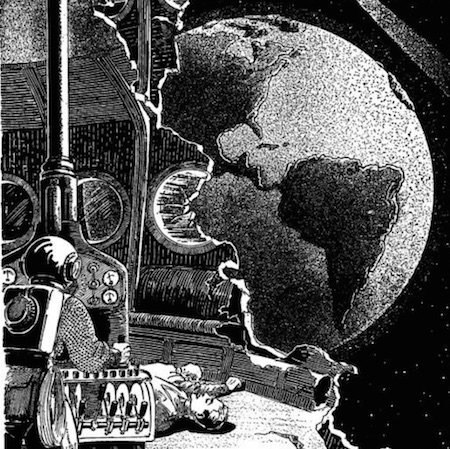Science Fiction
Dictionary
A B C D E F G H I J K L M N O P Q R S T U V W X Y Z
Latest By
Category:
Armor
Artificial
Intelligence
Biology
Clothing
Communication
Computers
Culture
Data Storage
Displays
Engineering
Entertainment
Food
Input Devices
Lifestyle
Living Space
Manufacturing
Material
Media
Medical
Miscellaneous
Robotics
Security
Space Tech
Spacecraft
Surveillance
Transportation
Travel
Vehicle
Virtual
Person
Warfare
Weapon
Work
"Beyond a thousand years from now humans are not quite recognizably human, and I have trouble finding characters."
- Larry Niven
| Mother World | ||
| One's home planet, or the origin world of one's species. |
Very early use of this phrase.
Leaving the wrecked Earth, explorers discover an ancient civilization on the Moon. One enormous artifact depicts an ancient Earth.
| A series of horizontal wavy lines was taken by the Earthians to represent water, and an arch, surmounting perpendicular wavy streaks, looked like a rain picture drawn by a prehistoric artist of the mother planet. And there was the likeness of the mother world itself — two circles in which the outlines of Earth's continents had been carved. The hemispheres were not readily distinguishable, however. The eastern continents were not quite in keeping with those known to the Earthians, the western hemisphere showed that North America was joined to Asia by a narrow neck of land, and between the Americas and Europe, nearer the latter continent and embraced in the circle showing the western half of the globe, lay a vast body of land which the Earthians had never seen, but which they knew to be Atlantis. The outlines of nearly all the continents were slightly different from those with which they were familiar. It was clear that great geologic changes had taken place since the maps were drawn. |
| Technovelgy from The Moon of Doom,
by Earl L. Bell. Published by Amazing Stories Quarterly in 1928 Additional resources -
|
Also seen in Asteroids of Death (1931) by Neil R. Jones:
Compare to home-world from A Honeymoon In Space (1901) by George Griffith.
I was weak and exhausted when like a huge, rotating ball, the mother world loomed before me. I slackened the speed of the ship to a minimum as I raced into the upper reaches of the atmosphere.
As I recall, the first time I encountered this phrase was in Arthur C. Clarke's wonderful 1955 novel Earthlight:

(The Mother World from 'The Asteroid of Death' by Neil R. Jones)
History, it has been said, never repeats itself but historical situations recur. Inevitably the new worlds began to loosen their ties with Earth. Their populations were still very small compared with those of the mother world but they contained the most brilliant and active minds the race possessed. Free at last from the crushing burden of tradition they planned to build civilizations which would avoid the mistakes of the past. The aim was a noble one — it might yet succeed.
Comment/Join this discussion ( 0 ) | RSS/XML | Blog This |
Additional
resources:
More Ideas
and Technology from The Moon of Doom
More Ideas
and Technology by Earl L. Bell
Tech news articles related to The Moon of Doom
Tech news articles related to works by Earl L. Bell
| A Remarkable Coincidence |
| Is It Time To Forbid Human Driving? |
| Indonesian Clans Battle |
| Liuzhi Process Now In Use In China |
Want to Contribute an
Item?
It's easy:
Get the name of the item, a
quote, the book's name and the author's name, and Add
it here.
| <Previous | Next> |
|
|
|
Technovelgy (that's tech-novel-gee!) is devoted to the creative science inventions and ideas of sf authors. Look for the Invention Category that interests you, the Glossary, the Science Fiction Invention Timeline, or see what's New.
|
Science Fiction
Timeline
1600-1899
1900-1939
1940's 1950's
1960's 1970's
1980's 1990's
2000's 2010's
'...there's a narrow belt where the climate is moderate.'
'... with the Master-operator all you have to do is push one! A remarkable achievement!'
'Not like me. A T-1000, advanced prototype. A mimetic poly-alloy. Liquid metal.'
'It was riddled with holes that were the mouths of tunnels.'
'The massive feet working the pedals, arms and hands flashing and glinting...'
'There were cubic miles of it, and it glistened like a silvery Christmas tree...'
'Jason had been guiding the caravan of cars as usual...'
"The robot solemnly hit a ball against the wall, picked it up and teed it, hit it again, over and again...'
